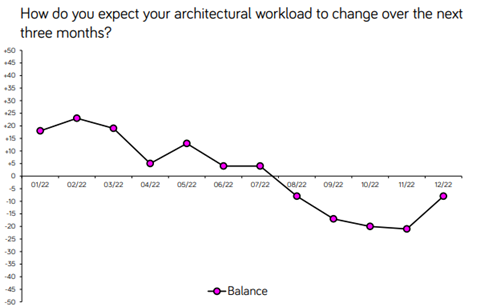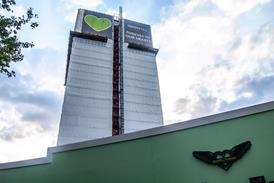RIBA survey records first increase in workload expectations since last May despite fears of a recession

Optimism levels among UK practices saw a significant uptick last month following a five month period of declining confidence.
Expectations of future workloads in December rose by the fastest rate since July 2020 at the end of the first covid lockdown, according to the latest RIBA Future Trends survey.

The balance of practices anticipating more work in the coming three months increased for the first time since last May and was back at the level seen in August.
Around 17% now expect workloads to increase and 25% expect them to decrease, with 58% expecting them to stay the same.
RIBA head of economic research and analysis Adrian Malleson said the upturn could be explained by greater government stability and resilient sectors such as hotels and high-end residential work.
He also said speculation that inflation may have peaked may be giving practices reason to be cautiously confident.
But he said more architects still expect workloads to decrease than increase, and 2022 was a year in which confidence fell overall.
“Practices were apprehensive about 2023, citing concerns around recession, fees levels, enquiry numbers, cashflow, and planning delays. Falling spending may harm investment in buildings,” he said.
“Ongoing challenges include a shortage of skilled tradespeople, downward pressure on fee levels, planning delays, PII costs, and competition from outside the profession.
“To look at the positives, construction products are more available and affordable, and in the recession, high-capital clients are likely to weather the storm, and some sectors will prove resilient.”
All regions remain downbeat except London, which returned an index figure of +4 for workload expectations. Any figure above zero indicates expectations that workloads will increase over the next three months.
The South of England was the least optimistic at -20, while Wales and the West and the North of England returned an index of -5.
However, all regions saw improved confidence levels aside from the Midlands and East Anglia, which dropped by four index points to -16.
Expectations of permanent staffing levels, which have been much more stable than workload expectations over the past year, recovered by three index points to -3 after a wobble in November when just 6% of practices were looking to hire.
Although 11% still expect redundancies over the next month, medium and large practices with at least 11 staff returned a permanent staffing index of zero.
















No comments yet